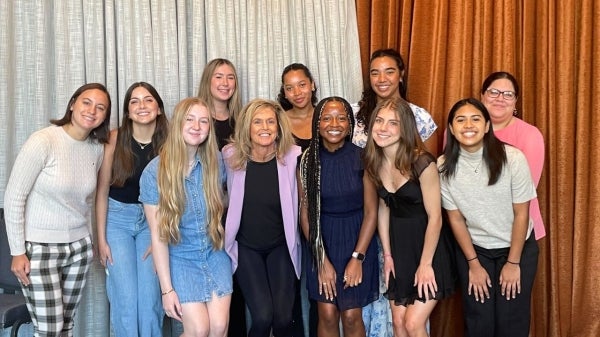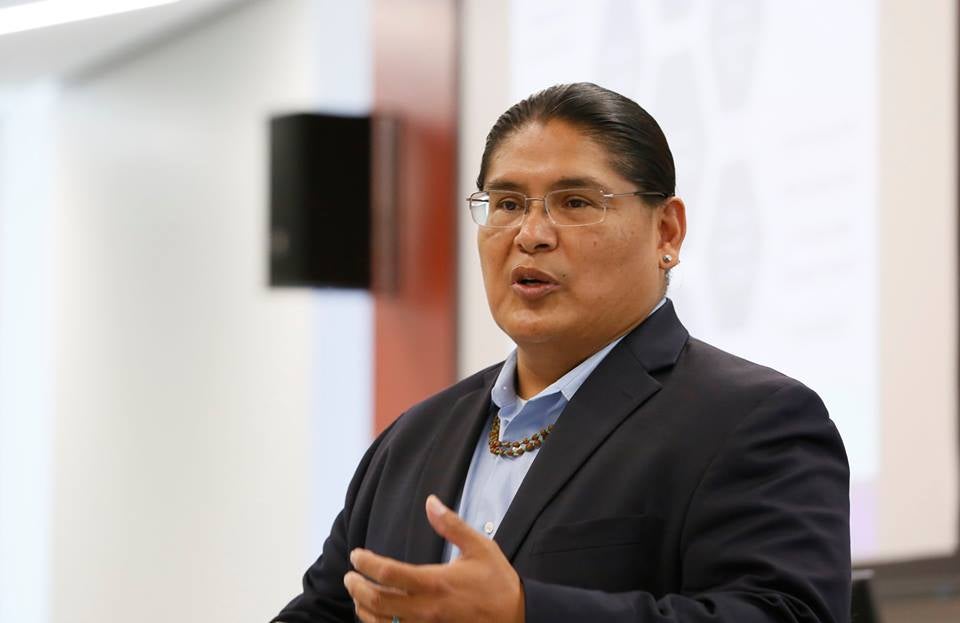The possibilities at Arizona State University are endless, just ask Christopher Deschene.
Deschene, director of the U.S. Department of Energy Office of Indian Energy Policy and Programs, grew up in near Page, Arizona, and is from the Navajo Nation. This month he visited with budding Indian Legal Program students at ASU's Sandra Day O’Connor College of Law in downtown Phoenix to talk about the Office of Indian Energy as students start thinking about developing their careers in law.
Deschene graduated from ASU in 2005 with a Master of Science in Mechanical Engineering and concurrent with his master’s studies, he earned a Juris Doctor (JD) through the Indian Legal Program with a focus on federal Indian law and energy and natural resources.
The Sandra Day O’Connor College of Law at ASU established the Indian Legal Program in 1988, providing a unique set of academic and clinical opportunities for students to understand the differences between the legal systems of Indian Nations and state and federal governments.
He recalled how little focus there was on energy.
“When I came here, people said you’re crazy because you want to stick to energy. Why are you doing that? We need lawyers and anything else but energy. I said, no one is focusing on energy,” Deschene said.
“When I first came to ASU they had offered energy as an elective. It wasn’t a mainstay discussion, and it wasn’t offered, Indian energy. We were talking more about natural resources and water.”
Licensed to practice law in Arizona and the Navajo Nation, he focused in business and energy development, natural resources and environmental policies. The goal: to strengthen tribal communities and sustain future generations.
Christopher Deschene, director of the U.S. Department of Energy Office of Indian Energy Policy and Programs.
Deschene described the Office of Indian Energy Policy and Programs as a progression of Indian energy and Indian energy policies. Among their goals for Indian Country is to promote energy development, efficiency and use and bring electrical power and service to Indian lands and the homes of tribal members.
There are 567 federally recognized tribes and there are staggering gaps between Indian Country and the rest of the U.S., including basic infrastructure needs like having ready access to electricity.
This is a consistent problem across Indian Country and an important problem Deschene and his office are trying to fix. He strongly believes tribes have potential, stating that American Indian lands consist of 2 percent of the land base, but tribes can provide up to 5 percent of the country’s renewable energy generation.
“There is potential in Indian Country, and it hasn’t been developed in a way to help national and administrative goals for energy security, resiliency, climate change. And Indian Country can be part of that,” Deschene said.
Deschene smiled and said people thought he was crazy because he pursued his graduate engineering degree with a focus on renewable energy while working on his JD.
Focused and determined, he knew where he was going.
“I’ve been to a number of schools, you guys are in the best program in the country. I will say that without any reservations,” he said, crediting Kate Rosier, executive director of the Indian Legal Program, for her support during his time at ASU.
He emphasized that there is a need for practitioners, lawyers, tribal and federal law practitioners who have are well-versed in energy.
Deschene had a vison and took the road less traveled, taking a dual-discipline approach, much like the interdisciplinary degrees offered at ASU today, fulfilling the mission of the New American University: solving for the problems of today and those of the future.
More Law, journalism and politics

CNN’s Wolf Blitzer to receive 41st Walter Cronkite Award for Excellence in Journalism
Wolf Blitzer, the longtime CNN journalist and anchor of “The Situation Room With Wolf Blitzer,” will accept the 41st Walter…

Cronkite School launches Women Leaders in Sports Media live-learn program
Women in a new sports media program at Arizona State University got a solid game plan from a sports veteran at an Aug. 20 welcome…

ASU center to host the Pursuits of Education and Excellence Symposium
The Center for the Study of Race and Democracy (CSRD) at Arizona State University is introducing the Pursuits of Education and…

